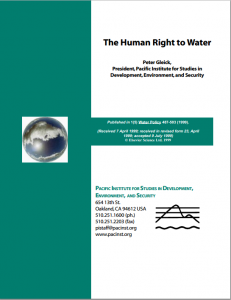The Human Right to Water

The Human Right to Water
More than a billion people in the developing world lack safe drinking water – an amenity those in the developed world take for granted. Nearly three billion people live without access to adequate sanitation systems necessary for reducing exposure to water-related diseases. The failure of the international aid community, nations, and local organizations to satisfy these basic human needs has led to substantial, unnecessary, and preventable human suffering. This paper argues that access to a basic water requirement is a fundamental human right implicitly and explicitly supported by international law, declarations, and State practice. Governments, international aid agencies, non-governmental organizations, and local communities should work to provide all humans with a basic water requirement and to guarantee that water as a human right. By acknowledging a human right to water and expressing the willingness to meet this right for those currently deprived of it, the water community would have a useful tool for addressing one of the most fundamental failures of 20th century development. Introduction The 21st century will open with one of the most fundamental conditions of human development unmet: universal access to basic water services. More than a billion people in the developing world lack safe drinking water that those in the developed world take for granted. Nearly three billion people live without access to adequate sanitation systems necessary to reduce exposure to water-related diseases. The failure of the international aid community, nations, and local organizations to satisfy these basic human needs has led to substantial, unnecessary, and preventable human suffering. An estimated 14 to 30 thousand people, mostly young children and the elderly, die every day from water-related diseases. At any given moment, approximately one-half of the people in the developing world suffer from disease caused by drinking contaminated water or eating contaminated food (United Nations, 1997b). A diverse array of individuals, professional groups, private corporations, and public governmental and non-governmental interests have recently stepped up efforts to better manage and plan for meeting basic water needs in the next century. The outcome of these efforts will be vital to the health and well-being of billions of people. This paper argues that access to a basic water requirement is a fundamental human right implicitly supported by international law, declarations, and State practice. In some ways this right to water is even more basic and vital than some of the more explicit human rights already acknowledged by the international community, as can be seen by its recognition in some local customary laws or religious canon.Overview

